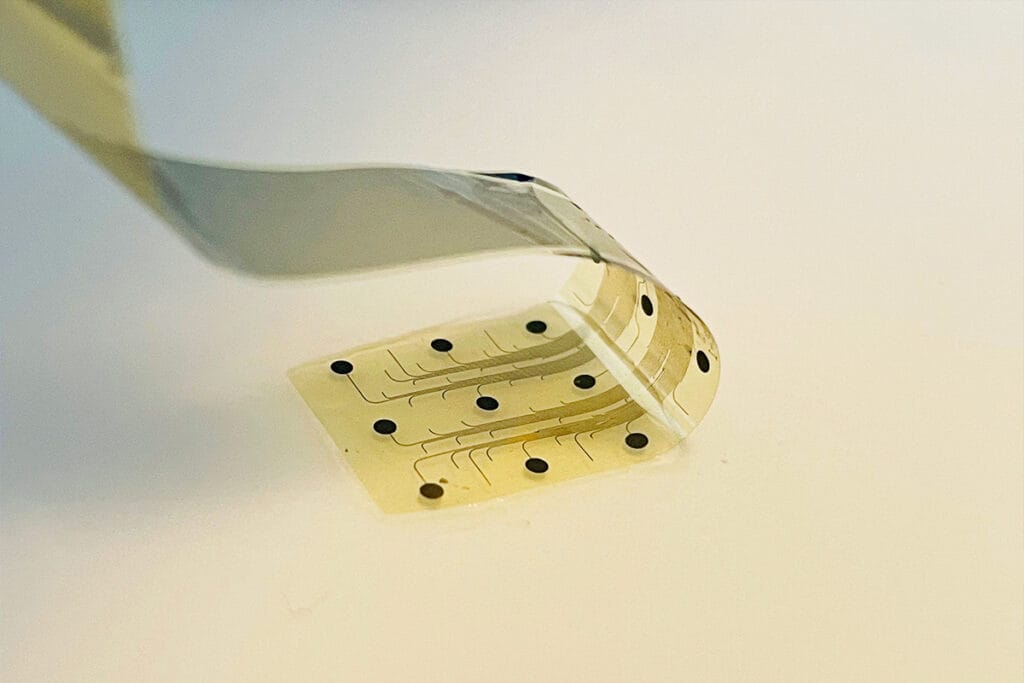[ad_1]
Neurotech lands $50m to commercialize graphene electrode BCI know-how that may decode and modulate neural alerts in real-time.
Whereas Elon Musk’s Neuralink tends to hog the headlines relating to brain-computer-interface know-how developments, different firms are additionally making vital strides within the subject. This week, Barcelona-based neurotech Inbrain Neuroelectronics efficiently raised $50 million in a Collection B financing spherical to advance its graphene-based BCI know-how. The corporate additionally revealed it has partnered with life sciences big Merck to facilitate the scientific growth of its BCI therapeutics for potential purposes throughout each the central and peripheral nervous system.
Inbrain’s know-how is being developed to allow customized and adaptive therapies for a spread of neurological circumstances, resembling Parkinson’s, with real-time monitoring to optimize therapeutic outcomes and reduce unintended effects. The brand new capital will allow the corporate to advance its ongoing scientific trials, develop its crew and additional develop the AI-driven facets of its platform to boost remedy effectiveness.
“We’re shaping the way forward for brain-computer interface therapeutics,” mentioned Carolina Aguilar, co-founder and CEO of Inbrain. “This funding empowers us to advance our AI-driven graphene neurotechnology, which has already proven nice outcomes versus present business neuromodulation know-how.”


Based mostly on graphene, a novel materials valued for its flexibility, energy and conductivity, Inbrain’s platform goals to ship a excessive degree of precision in neuromodulation by way of the usage of AI and micrometric graphene electrodes that may decode and modulate neural alerts in real-time. With an ultra-thin design of simply 10 micrometers, the corporate claims its first implant can safely work together with neural tissue, providing a degree of element in neural sign processing that has but to be achieved by different neuromodulation gadgets.
Inbrain just lately introduced the world’s first human implantation of its BCI in a scientific trial at Salford Royal Hospital in Manchester, UK. The continuing trial seeks to judge the security of Inbrain’s machine in sufferers with mind most cancers and can enroll as much as ten members to find out the potential benefits of graphene over conventional supplies in neural purposes.
Inbrain has already achieved FDA Breakthrough Machine Designation for its platform’s potential to focus on Parkinson’s Illness, and the corporate’s subsidiary, INNERVIA Bioelectronics, is engaged on increasing the know-how to deal with peripheral nerve and systemic illnesses.


The brand new funding spherical, which brings the full raised by the corporate to $68 million, was led by imec.xpand and likewise included contributions from the European Innovation Council’s EIC Fund, Fond ICO Subsequent Tech, CDTI-Innvierte and Avançsa, alongside current buyers.
“By harnessing the outstanding properties of graphene, Inbrain is advancing cutting-edge neurotechnology purposes that might considerably enhance affected person outcomes and likewise place Europe as one of many leaders within the world BCI trade,” mentioned Marcin Nowak, funding director at European Funding Financial institution.
Lead investor imec.xpand is an funding fund related to imec, a nanoelectronics R&D and innovation hub, which is supporting Inbrain to scale its know-how for business manufacturing.
“This distinctive graphene-based BCI platform has the potential to redefine how we deal with neurological issues by providing extra exact, adaptable, and clever therapeutics,” mentioned Frank Bulens, accomplice at imec.xpand. “We look ahead to supporting the Inbrain crew in accelerating their scientific trials and bringing this next-generation know-how to sufferers.”
Keep tuned for our interview with Inbrain CEO Carolina Aguilar subsequent week!
[ad_2]
Source link




